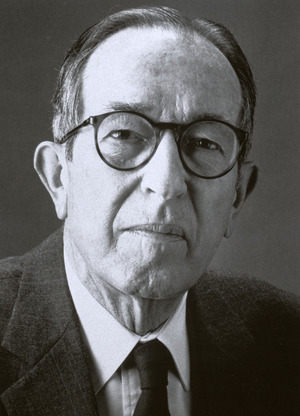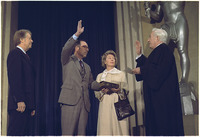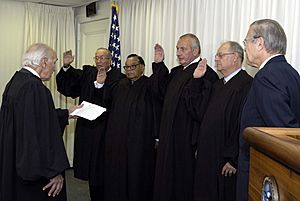Griffin Bell facts for kids
Quick facts for kids
Griffin Bell
|
|
|---|---|

Bell in 1985
|
|
| 72nd United States Attorney General | |
| In office January 26, 1977 – August 16, 1979 |
|
| President | Jimmy Carter |
| Preceded by | Edward H. Levi |
| Succeeded by | Benjamin R. Civiletti |
| Judge of the United States Court of Appeals for the Fifth Circuit | |
| In office October 5, 1961 – March 1, 1976 |
|
| Appointed by | John F. Kennedy |
| Preceded by | Seat established |
| Succeeded by | James Clinkscales Hill |
| Personal details | |
| Born |
Griffin Boyette Bell
October 31, 1918 Americus, Georgia, U.S. |
| Died | January 5, 2009 (aged 90) Atlanta, Georgia, U.S. |
| Political party | Democratic |
| Education | Mercer University (LLB) |
Griffin Boyette Bell (born October 31, 1918 – died January 5, 2009) was an important American lawyer and judge. He served as the 72nd Attorney General of the United States under President Jimmy Carter. Before that, he was a U.S. circuit judge for the United States Court of Appeals for the Fifth Circuit.
Contents
Early Life and Career
Griffin Bell was born on October 31, 1918, in Americus, Georgia. He joined the United States Army and served from 1942 to 1946. He worked in parts of the army that handled supplies and transportation. He reached the rank of major.
After leaving the army, Bell went to law school. He earned a law degree in 1948 from Mercer University School of Law. He then started working as a lawyer in different cities in Georgia.
- From 1948 to 1952, he worked in Savannah.
- From 1952 to 1953, he worked in Rome.
- From 1953 to 1961, he worked for a law firm called King & Spalding in Atlanta.
He also served as the chief of staff for Governor Ernest Vandiver from 1959 to 1961.
Becoming a Federal Judge
President John F. Kennedy chose Griffin Bell to become a judge for the United States Court of Appeals for the Fifth Circuit. This happened on October 5, 1961. The United States Senate approved his appointment on February 5, 1962. He officially became a judge on February 9, 1962.
He worked as a judge until March 1, 1976, when he decided to step down. During his time as a judge, he also served on the board of the Federal Judicial Center from 1973 to 1976.
Serving as Attorney General
After leaving his judge position, Griffin Bell returned to working as a lawyer in Atlanta in 1976. Then, in 1977, President Jimmy Carter asked him to become the Attorney General of the United States. The Attorney General is the chief law enforcement officer and chief lawyer of the U.S. government.
Bell served in this important role until 1979. During his time as Attorney General, he worked to make sure that government activities followed the law. He made new rules that required any special legal activities to be written down. This helped ensure that everything was done properly and transparently.
Later Years and Legacy
After his time as Attorney General, Bell went back to working as a lawyer in Atlanta. He continued this work until he passed away in 2009.
In September 2004, he was appointed as the Chief Judge of the United States Court of Military Commission Review. This court reviews certain military legal cases. He served in this role until July 2007, when he stepped down due to health reasons.
Griffin Bell passed away on January 5, 2009, in Atlanta. He was being treated for health issues, including kidney disease. The governor of Georgia ordered flags to be flown at half-staff on the day of his funeral. He is buried in Americus, Georgia. His tombstone says he was a "Citizen Soldier, Trial Lawyer, Federal Appellate Judge, Attorney General of the United States."
Bell had a long connection with the Georgia Historical Society. He was a member for over 50 years. He also served as the honorary chairman of their advisory board. In 2008, he gave his personal papers to the Society. These papers are now available for people to research and learn more about his life and work.
Honors and Awards
In December 2008, Griffin Bell received a special honorary degree from Georgia Southwestern State University. This award recognized his achievements and his efforts to support his old university.
See also
- List of United States political appointments that crossed party lines
 | Chris Smalls |
 | Fred Hampton |
 | Ralph Abernathy |



